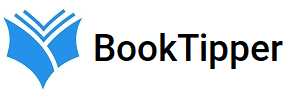Featured Non-Fiction & Biography

HONEY, BABY, MINE
by Laura Dern & Diane Ladd
“As actors, Dern and Ladd have spent decades peeling back layers to reveal their characters’ fears and desires. It’s when they turn that focus to each other and themselves that something remarkable emerges.”—New York Times
A collection of deeply personal conversations from award-winning actress and activist Laura Dern and the woman she admires most, her mother—legendary actress Diane Ladd.
What happens when we are brave enough to speak our truths to the ones we love the most?
Laura Dern and Diane Ladd always had a close relationship, but the stakes were raised when Diane developed a sudden life-threatening illness. Diane’s doctor prescribed long walks to build back her lung capacity. The exertion was challenging, and Laura soon learned the best way to distract her mom was to get her talking and telling stories.
Their conversations along the way began to break down the traditional barriers between mothers and daughters. They discussed the most personal topics: love, sex, marriage, divorce, art, ambition, and legacy. In Honey, Baby, Mine, Laura and Diane share these conversations, as well as reflections and anecdotes, taking readers on an intimate tour of their lives. Complementing these candid exchanges, they have included photos, family recipes, and other mementos. The result is a celebration of the power of leaving nothing unsaid that will make you want to call the people you love the most and start talking.

MONSTERS: A FAN'S DILEMMA
by Claire Dederer
A NEW YORK TIMES MOST ANTICIPATED BOOK • A passionate, provocative, blisteringly smart interrogation of how we make and experience art in the age of #MeToo, and of the link between genius and monstrosity. • From the author of the New York Times best seller Poser and the acclaimed memoir Love and Trouble
“Thrillingly sharp, appropriately doubtful, and more fun than you would believe, given the pressing seriousness of the subject matter.” —Nick Hornby, best-selling author of High Fidelity
In this unflinching, deeply personal book that expands on her instantly viral Paris Review essay, “What Do We Do with the Art of Monstrous Men?” Claire Dederer asks: Can we love the work of Hemingway, Polanski, Naipaul, Miles Davis, or Picasso? Should we love it? Does genius deserve special dispensation? Is male monstrosity the same as female monstrosity? Does art have a mandate to depict the darker elements of the psyche? And what happens if the artist stares too long into the abyss?
She explores the audience’s relationship with artists from Woody Allen to Michael Jackson, asking: How do we balance our undeniable sense of moral outrage with our equally undeniable love of the work? In a more troubling vein, she wonders if an artist needs to be a monster in order to create something great. And if an artist is also a mother, does one identity inexorably, and fatally, interrupt the other? Highly topical, morally wise, honest to the core, Monsters is certain to incite a conversation about whether and how we can separate artists from their art.
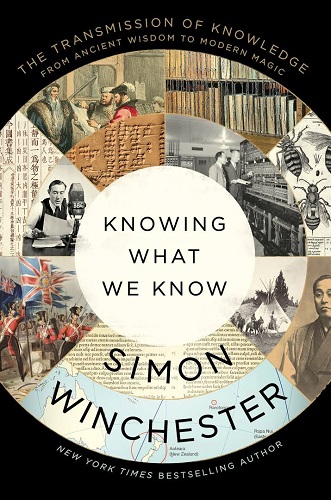
KNOWING WHAT WE KNOW
by Simon Winchester
From the creation of the first encyclopedia to Wikipedia, from ancient museums to modern kindergarten classes—this is award winning writer Simon Winchester’s brilliant and all-encompassing look at how humans acquire, retain, and pass on information and data, and how technology continues to change our lives and our minds.
With the advent of the internet, any topic we want to know about is instantly available with the touch of a smartphone button. With so much knowledge at our fingertips, what is there left for our brains to do? At a time when we seem to be stripping all value from the idea of knowing things—no need for math, no need for map-reading, no need for memorization—are we risking our ability to think? As we empty our minds, will we one day be incapable of thoughtfulness?
Addressing these questions, Simon Winchester explores how humans have attained, stored, and disseminated knowledge. Examining such disciplines as education, journalism, encyclopedia creation, museum curation, photography, and broadcasting, he looks at a whole range of knowledge diffusion—from the cuneiform writings of Babylon to the machine-made genius of artificial intelligence, by way of Gutenberg, Google, and Wikipedia to the huge Victorian assemblage of the Mundanaeum, the collection of everything ever known, currently stored in a damp basement in northern Belgium.
Studded with strange and fascinating details, Knowing What We Know is a deep dive into learning and the human mind. Throughout this fascinating tour, Winchester forces us to ponder what rational humans are becoming. What good is all this knowledge if it leads to lack of thought? What is information without wisdom? Does Rene Descartes’s Cogito, ergo sum—“I think therefore I am,” the foundation for human knowledge widely accepted since the Enlightenment—still hold?
And what will the world be like if no one in it is wise?

GENERATIONS
by Jean M. Twenge, PhD
A groundbreaking, revelatory portrait of the six generations that currently live in the United States and how they connect, conflict, and compete with one another—from the acclaimed author of Generation Me and iGen.
The United States is currently home to six generations of people:
-the Silents, born 1925–1945
-Baby Boomers, born 1946–1964
-Gen X, born 1965–1979
-Millennials, born 1980–1994
-Gen Z, born 1995–2012
-and the still-to-be-named cohorts born after 2012.
They have had vastly different life experiences and thus, one assumes, they must have vastly diverging beliefs and behaviors. But what are those differences, what causes them, and how deep do they actually run?
Professor of psychology and “reigning expert on generational change” (Lisa Wade, PhD, author of American Hookup), Jean Twenge does a deep dive into a treasure trove of long-running, government-funded surveys and databases to answer these questions. Are we truly defined by major historical events, such as the Great Depression for the Silents and September 11 for Millennials? Or, as Twenge argues, is it the rapid evolution of technology that differentiates the generations?
With her clear-eyed and insightful voice, Twenge explores what the Silents and Boomers want out of the rest of their lives; how Gen X-ers are facing middle age; the ideals of Millennials as parents and in the workplace; and how Gen Z has been changed by COVID, among other fascinating topics.
Surprising, engaging, and informative, Generations will forever change the way you view your parents, peers, coworkers, and children, no matter which generation you call your own.
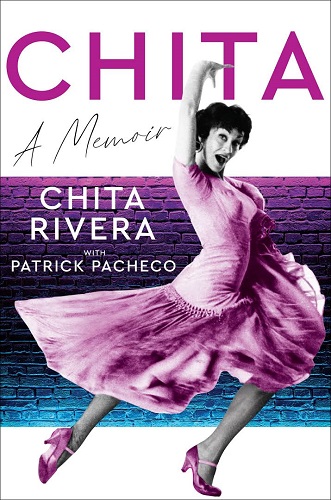
CHITA: A MEMOIR
by Chita Rivera with Patrick Pacheco
The long-awaited and wildly entertaining memoir of the star of stage and screen, the legendary Chita Rivera—three-time Tony Award–winner, Kennedy Centers honoree, and recipient of the Presidential Medal of Freedom.
She was born Dolores Conchita Figueroa del Rivero—until the entertainment world renamed her. But Dolores—the irreverent side of the sensual, dark and ferocious Chita—was always present center stage, and was influential in creating some of Broadway most iconic and acclaimed roles, including Anita in West Side Story‚ the part that made her a star—Rosie in Bye Bye, Birdie, Velma in Chicago, and Aurora in Kiss of the Spider Woman.
Written in gratitude to her longstanding fans and with the hope that new generations may learn from her extraordinary experience, Chita takes us behind the curtain to reveal the highs and lows of one extraordinary showbusiness career—the creative fermentation, the ego clashes, the miraculous discoveries, the exhilaration when it all went right, and the disappointment when it all went wrong. Chita invites us into workrooms and rehearsal studies, on stage and on set as she works with some of the greatest talents of the age, including Leonard Bernstein, Arthur Laurents, Stephen Sondheim, Bob Fosse, Jerome Robbins, Hal Prince, Liza Minnelli, Sammy Davis Jr, Gwen Verdon, Shirley MacLaine, and many others. We also learn deeply moving, revelatory details about her upbringing and her heritage, and how they indelibly shaped her work and career.
This colorful and entertaining memoir—as vital and captivating as Chita herself—is the unforgettable and engrossing personal story of a performer who blazed her own trail and inspired countless performers to forge their own unique path to success.

PANDORA'S GAMBLE
by Alison Young
This fearless, deeply reported book about laboratory accidents asks the haunting question some elite scientists don’t want the public to entertain: Did the COVID-19 pandemic start with a lab leak in Wuhan, China?
This is an obvious question. Yet there’s been an extraordinary effort by government officials in China, as well as leading scientific experts in the United States and around the world, to shut down any investigation or discussion of the lab leak theory. In private, however, some of the world’s elite scientists have seen a lab accident as a very real and horrifying possibility. They know what the public doesn’t. Lab accidents happen with shocking frequency. Even at the world’s best-run labs.
That’s among the revelations from Alison Young, the award-winning investigative reporter who has spent nearly 15 years uncovering shocking safety breaches at prestigious U.S. laboratories for USA Today and other respected news outlets.
In Pandora’s Gamble, Young goes deep into the troubling history — and enormous risks — of leaks and accidents at scientific labs. She takes readers on a riveting journey around the world to some of the worst lab mishaps in history, including the largely unknown stories of the lab workers at the U.S. Army’s Camp Detrick who suffered devastating infections at alarming rates during World War II. And her groundbreaking reporting exposes for the first time disturbing new details about recent accidents at prestigious laboratories – and the alarming gaps in government oversight that put all of us at risk.
Sourced through meticulous reporting and exclusive interviews with key players including Dr. Anthony Fauci, former CDC Director Tom Frieden and others, Young’s examination reveals that the only thing rare about lab accidents is the public rarely finds out about them. Because when accidents happen, powerful people and institutions often work hard to keep the information secret.
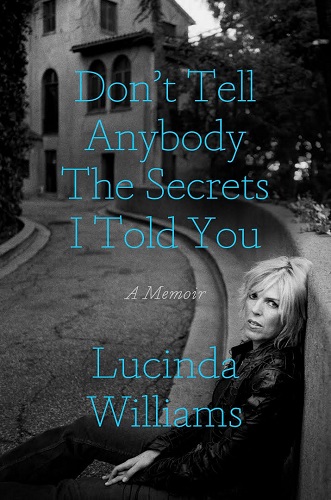
DON'T TELL ANYBODY THE SECRETS I TOLD YOU
by Lucinda Williams
The iconic singer-songwriter and three-time Grammy winner opens up about her traumatic childhood in the Deep South, her years of being overlooked in the music industry, and the stories that inspired her enduring songs in this “deeply personal” (The New York Times) memoir.
Lucinda Williams’s rise to fame was anything but easy. Raised in a working-class family in the Deep South, she moved from town to town each time her father—a poet, a textbook salesman, a professor, a lover of parties—got a new job, totaling twelve different places by the time she was eighteen. Her mother suffered from severe mental illness and was in and out of hospitals. And when Williams was about a year old, she had to have an emergency tracheotomy—an inauspicious start for a singing career. But she was also born a fighter, and she would develop a voice that has captivated millions.
In Don’t Tell Anybody the Secrets I Told You, Williams takes readers through the events that shaped her music—from performing for family friends in her living room to singing at local high schools and colleges in Mexico City, to recording her first album with Folkway Records and headlining a sold-out show at Radio City Music Hall. She reveals the inspirations for her unforgettable lyrics, including the doomed love affairs with “poets on motorcycles” and the gothic southern landscapes of the many different towns of her youth, including Macon, Lake Charles, Baton Rouge, and New Orleans. Williams spent years working at health food stores and record stores during the day so she could play her music at night, and faced record companies who told her that her music was not “finished,” that it was “too country for rock and too rock for country.” But her fighting spirit persevered, leading to a hard-won success that spans seventeen Grammy nominations and a legacy as one of the greatest and most influential songwriters of our time.
Raw, intimate, and honest, Don’t Tell Anybody the Secrets I Told You is an evocative reflection on an extraordinary woman’s life journey.

THE HALF OF IT
by Madison Beer
A memoir from singer-songwriter Madison Beer, chronicling the past decade of her life spent in the spotlight—the ups, the downs, and the in-betweens that you won’t see on social media.
Discovered at twelve years old, Madison Beer was one of the first artists to have her entire life documented online. Over the past decade, she has navigated the spotlight as a child, through her teenage years, and now as a young woman in her twenties.
In The Half of It, Madison pulls back the curtain to show the behind-the-scenes of her journey, from reckoning with mass hate online and the time her private pictures were leaked, to battling suicidal thoughts while making her highly acclaimed debut album, Life Support, and her recovery since then. This memoir is an honest and unflinching account of self-love, mental health, and advocacy from one of the fastest-rising musical voices and most influential social media presences of her generation. It hammers home the point, more striking and urgent than ever, that no matter how close the internet may make us feel to people, we truly don’t know the half of it.
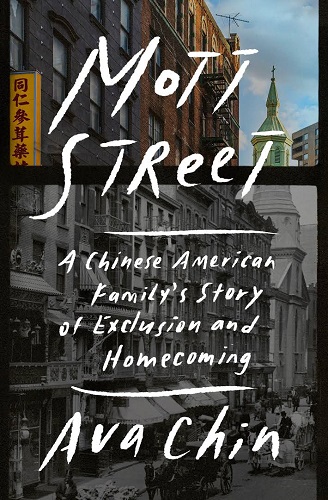
MOTT STREET
by Ava Chin
A sweeping narrative history of the Chinese Exclusion Act through an intimate portrayal of one family’s epic journey to lay down roots in America
* A Good Morning America and Book Riot Most-Anticipated Book *
As the only child of a single mother in Queens, Ava Chin found her family’s origins to be shrouded in mystery. She had never met her father, and her grandparents’ stories didn’t match the history she read at school. Mott Street traces Chin’s quest to understand her Chinese American family’s story. Over decades of painstaking research, she finds not only her father but also the building that provided a refuge for them all.
Breaking the silence surrounding her family’s past meant confronting the Chinese Exclusion Act of 1882—the first federal law to restrict immigration by race and nationality, barring Chinese immigrants from citizenship for six decades. Chin traces the story of the pioneering family members who emigrated from the Pearl River Delta, crossing an ocean to make their way in the American West of the mid-nineteenth century. She tells of their backbreaking work on the transcontinental railroad and of the brutal racism of frontier towns, then follows their paths to New York City.
In New York’s Chinatown she discovers a single building on Mott Street where so many of her ancestors would live, begin families, and craft new identities. She follows the men and women who became merchants, “paper son” refugees, activists, and heads of the Chinese tong, piecing together how they bore and resisted the weight of the Exclusion laws. She soon realizes that exclusion is not simply a political condition but also a personal one.
Gorgeously written, deeply researched, and tremendously resonant, Mott Street uncovers a legacy of exclusion and resilience that speaks to the American experience, past and present.
Still Hot in Non-Fiction & Biography

POVERTY, BY AMERICA
by Matthew Desmond
#1 NEW YORK TIMES BESTSELLER • The Pulitzer Prize–winning author of Evicted reimagines the debate on poverty, making a “provocative and compelling” (NPR) argument about why it persists in America: because the rest of us benefit from it.
“Urgent and accessible . . . Its moral force is a gut punch.”—The New Yorker
ONE OF THE MOST ANTICIPATED BOOKS OF 2023: The Washington Post, Time, Esquire, Newsweek, Minneapolis Star Tribune, Elle, Salon, Lit Hub, Kirkus Reviews
The United States, the richest country on earth, has more poverty than any other advanced democracy. Why? Why does this land of plenty allow one in every eight of its children to go without basic necessities, permit scores of its citizens to live and die on the streets, and authorize its corporations to pay poverty wages?
In this landmark book, acclaimed sociologist Matthew Desmond draws on history, research, and original reporting to show how affluent Americans knowingly and unknowingly keep poor people poor. Those of us who are financially secure exploit the poor, driving down their wages while forcing them to overpay for housing and access to cash and credit. We prioritize the subsidization of our wealth over the alleviation of poverty, designing a welfare state that gives the most to those who need the least. And we stockpile opportunity in exclusive communities, creating zones of concentrated riches alongside those of concentrated despair. Some lives are made small so that others may grow.
Elegantly written and fiercely argued, this compassionate book gives us new ways of thinking about a morally urgent problem. It also helps us imagine solutions. Desmond builds a startlingly original and ambitious case for ending poverty. He calls on us all to become poverty abolitionists, engaged in a politics of collective belonging to usher in a new age of shared prosperity and, at last, true freedom.

GOT YOUR NUMBER
by Mike Greenberg with Paul Hembekides
ESPN personality (Get Up and #Greeny) and New York Times bestselling author Mike Greenberg partners with mega-producer Hembo to settle once and for all which legends flat-out own which numbers. In short essays certain to provoke debate between and amongst all generations, Greeny uses his lifetime of sports knowledge to spin yarns of the legends among the legends and tell you why some have claimed their spot in the top 100 of all time.
Sports and numbers go hand in hand.
Sports and loud, assertive debate? Even better.
Cheering on, agonizing over, and being in plain awe of your favorite players has left you with a deep and intricate memory of their greatness, not to mention well-honed arguments as to why your favorites are really the best. In arenas, in front of your TV, and in bars, you’ve debated friends and strangers alike. You’ve joyfully mocked your friends’ (sometimes laughable) favorites. You’ve spouted accomplishments, statistics: Yours won six titles, batted .350 in the clutch, or generated 82% of their team’s scoring.
But not all numbers are created equal. Some are accomplishments. Others are identity.
Looming large over any image you have of an athlete: the number on their jersey. Numbers often provide the most visceral parts of any sports legend’s identity. They are what people remember—worldwide. Jordan, Jeter, Brady—to fans, they are as much their number as they are anything else.
Sure, 1 through 100 might seem like a large range, but fierce competition across the ages has blessed only a lucky few to claim one of these as their own. For some, the victors may not be so obvious. That’s why Greeny’s here to help.
Ascend into discussion, fans of all stripes. Come away enlightened. Or maybe a little enraged. Either way, you are sure to be occasionally surprised—and endlessly entertained. Whatever your sport, welcome to the place where all the arguments are finally decided, once and for all.

A FEVER IN THE HEARTLAND
by Timothy Egan
“With narrative elan, Egan gives us a riveting saga of how a predatory con man became one of the most powerful people in 1920s America, Grand Dragon of the Ku Klux Klan, with a plan to rule the country—and how a grisly murder of a woman brought him down. Compelling and chillingly resonant with our own time.” —Erik Larson, author of The Splendid and the Vile
“Riveting…Egan is a brilliant researcher and lucid writer.” —Minneapolis Star Tribune
A historical thriller by the Pulitzer and National Book Award-winning author that tells the riveting story of the Klan’s rise to power in the 1920s, the cunning con man who drove that rise, and the woman who stopped them.
The Roaring Twenties–the Jazz Age–has been characterized as a time of Gatsby frivolity. But it was also the height of the uniquely American hate group, the Ku Klux Klan. Their domain was not the old Confederacy, but the Heartland and the West. They hated Blacks, Jews, Catholics and immigrants in equal measure, and took radical steps to keep these people from the American promise. And the man who set in motion their takeover of great swaths of America was a charismatic charlatan named D.C. Stephenson.
Stephenson was a magnetic presence whose life story changed with every telling. Within two years of his arrival in Indiana, he’d become the Grand Dragon of the state and the architect of the strategy that brought the group out of the shadows – their message endorsed from the pulpits of local churches, spread at family picnics and town celebrations. Judges, prosecutors, ministers, governors and senators across the country all proudly proclaimed their membership. But at the peak of his influence, it was a seemingly powerless woman – Madge Oberholtzer – who would reveal his secret cruelties, and whose deathbed testimony finally brought the Klan to their knees.
A FEVER IN THE HEARTLAND marries a propulsive drama to a powerful and page-turning reckoning with one of the darkest threads in American history.
As an Amazon Associate, we may earn money from qualifying purchases.
